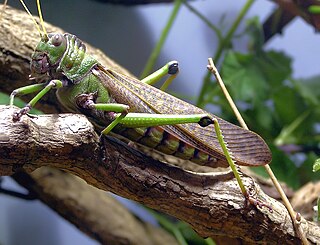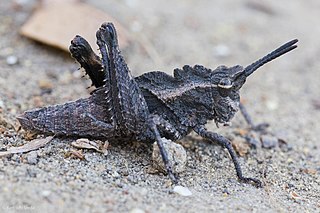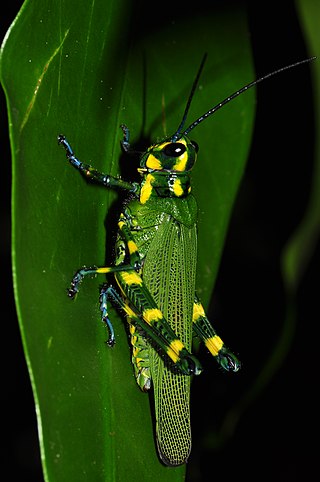
The grasshopper subfamily Acridinae, sometimes called silent slant-faced grasshoppers, belong of the large family Acrididae in the Orthoptera: Caelifera.

The Romaleidae or lubber grasshoppers are a family of grasshoppers, based on the type genus Romalea. The species in this family can be found in the Americas.

Romalea is a genus of grasshoppers native to the Southeastern and South-central United States. As traditionally defined, it contains a single species, Romalea microptera, known commonly as the Georgia Thumper,eastern lubber grasshopper, Florida lubber, or Florida lubber grasshopper, although some recent authorities regard Taeniopoda as a junior synonym, in which case there are about a dozen Romalea species in southern United States, Mexico and Central America.

Tetrigidae is an ancient family in the order Orthoptera, which also includes similar families such as crickets, grasshoppers, and their allies. Species within the Tetrigidae are variously called groundhoppers, pygmy grasshoppers, pygmy devils or "grouse locusts".

Tettigidea is a genus of groundhoppers or pygmy grasshoppers in the tribe Batrachideini from the Americas. There are at least 40 described species in Tettigidea.

Trimerotropis is a genus of band-winged grasshoppers in the family Acrididae. There are at least 50 described species in Trimerotropis.

Taeniopoda eques, the western horse lubber grasshopper, is a relatively large grasshopper species of the family Romaleidae found in arid and semi-arid parts of southwestern United States to central and southwestern Mexico. Most populations are identifiable by their shiny black bodies with contrasting yellow markings, but some adults are mostly yellowish, orangish or greenish. The species is unique in using its black coloration to thermoregulate and in being chemically defended. The aposematic coloration warns vertebrate predators of its unpalatability and allows the grasshopper to roost conspicuously upon shrubs.
Phrynotettix robustus, known generally as the robust toad lubber or robust toad hopper, is a species of lubber grasshopper in the family Romaleidae. It is found in North America.

Arphia is a genus of band-winged grasshoppers in the family Acrididae. There are at least 11 described species in the genus Arphia.

Circotettix is a genus of band-winged grasshoppers in the family Acrididae. There are about 9 described species in Circotettix.

Phrynotettix is a genus of toad lubbers in the family Romaleidae. There are at least three described species in Phrynotettix.

Romaleinae is a subfamily of lubber grasshoppers in the family Romaleidae, found in North and South America. More than 60 genera and 260 described species are placed in the Romaleinae.

Rhammatocerus is a genus of grasshoppers in the subfamily Gomphocerinae and the tribe Scyllinini. There are about 16 described species in Rhammatocerus, including R. schistocercoides, the "Mato Grosso locust".

Orphulella is a genus of slant-faced grasshoppers in the family Acrididae. There are more than 20 described species in Orphulella, all found in the Americas.

Dracotettix is a genus of dragon lubbers in the family Romaleidae. There are at least three described species in Dracotettix.

Stenacris is a genus of spur-throat toothpick grasshoppers in the family Acrididae. There are about six described species in Stenacris.

Amblytropidia is a genus of slant-faced grasshoppers in the family Acrididae. There are about 14 described species in Amblytropidia.

Brachystola is a genus of grassland lubber grasshoppers in the family Romaleidae, found in the United States and Mexico. They are among the largest grasshoppers found in North America. The species Brachystola magna has meiotic chromosomes that are relatively large and easily visible, and was used in early genetic studies.

Chromacris is a genus of lubber grasshoppers in the family Romaleidae. The nine described species in Chromacris are found in Mexico, Central America, or South America. They often have bright aposematic colors and they are presumed to be toxic.

Tropidacris cristata, the giant red-winged grasshopper, is a widespread species of lubber grasshopper in the family Romaleidae from tropical South and Central America, and Mexico. It is among the largest grasshoppers in the world by length and wingspan, reaching up to 14.5 cm (5.7 in) and 24 cm (9.4 in) respectively. More typical adult lengths are 5.5–7 cm (2.2–2.8 in), average 6.5 cm (2.6 in), in males and 7–12 cm (2.8–4.7 in), average 11 cm (4.3 in), in females. As suggested by the common name, adult T. cristata have conspicuously red wings in flight, although the exact red hue varies. The flightless and gregarious nymphs have aposematic dark-and-yellow stripes and are presumed to be toxic.



















